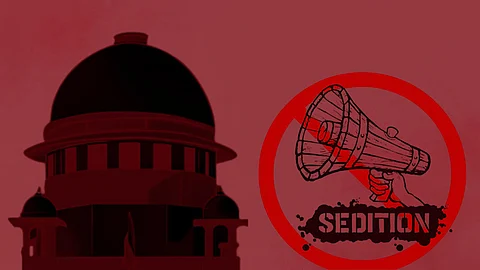

ON FRIDAY, THE SUPREME COURT ISSUED a notice to the Union government on a public interest litigation (‘PIL’) challenging Section 152 of the Bharatiya Nyaya Sanhita (BNS), which reintroduces the colonial sedition law previously codified as Section 124A of the Indian Penal Code (‘IPC’).
A three-judge Bench comprising Chief Justice of India (‘CJI’) B.R. Gavai, and Justices K. Vinod Chandran and N.V. Anjaria, also tagged the PIL with the batch of petitions pending before the Supreme Court challenging Section 124A of the IPC.
The Bench was hearing a PIL filed by retired Major General of the Indian Army, S.G. Vombatkere, through advocate Prasanna S. who earlier filed a petition challenging Section 124A of the IPC in 2021.
Importantly, on May 11, 2022, while hearing a challenge to Section 124A of the IPC, the Supreme Court directed that the said section be kept in abeyance.
What does Vombatkere’s petition argue?
Vombatkere contends that Section 152 of the BNS is nothing but a repackaged sedition law, reinstated despite the pending challenge and suspension of Section 124A.
The petition reads: “Though the language is altered, its substantive content—criminalising vague and broad categories of speech and expression such as ‘subversive activity,’ ‘encouragement of separatist feelings,’ and acts ‘endangering unity or integrity of India’—remains the same or is even more expansive.”
The petition argues that Section 152 criminalises a wide spectrum of expressive conduct, including those who “purposely or knowingly” use words—spoken, written, electronic, symbolic, or financial—to “excite or attempt to excite” secession, rebellion, or subversive activities.
It states: “Its sweeping language, including phrases like ‘encouraging feelings of separatist activities,’ fails the test of constitutional validity due to vagueness, overbreadth, chilling effect, disproportionate punishment, and absence of proximate nexus to public disorder.”
The petition further states that Section 152 violates the principles of clarity, necessity, and proportionality and permits arbitrary state action.
It adds that Section 152 BNS threatens democratic discourse and the right to dissent, and thus cannot be permitted to remain on the statute book.
It also argues that each component of the section suffers from vagueness, overbreadth, and arbitrariness, thereby violating Articles 14, 19(1)(a), and 21 of the Constitution.
Going further, the petition states that the title of Section 152 itself prejudges and colors the conduct described in the provision as one that “endangers” national integrity without requiring any proof of such actual consequence.
The petition highlights: “The terms ‘endangering,’ ‘sovereignty,’ ‘unity,’ and ‘integrity’ are undefined in the BNS or any other statute. These vague and abstract constitutional ideals cannot serve as legally determinable standards. The term ‘endangering’ is particularly elastic and imprecise, ranging from acts of actual incitement to mere expression of critical or dissenting political opinions. As a result, the title invites prosecutorial and police discretion, leading to arbitrary and discriminatory application, especially against dissenters, minorities, journalists, and civil society actors.”
It further contends that Section 152 criminalizes conduct carried out “by words, either spoken or written, or by signs, or by visible representation, or by electronic communication, or by use of financial means, or otherwise…”.
The petitioner argues that this phrasing captures nearly all modes of communication and even financial acts, expanding criminal liability far beyond speech.
The petitioner contends: “The phrase ‘or by use of financial means’ is entirely undefined and may criminalize legitimate financial contributions, fundraising, or donations, even when unrelated to any unlawful act. The catch-all phrase ‘or otherwise’ renders the scope of the section limitless, in violation of the rule of law.”
It adds: “Section 152 criminalizes acts done ‘purposely or knowingly,’ yet neither term is defined in the BNS. While ‘purposely’ may suggest a specific intent, ‘knowingly’ is a broader term that encompasses conduct where the accused may only have foreseen the consequence, regardless of intent.”
The petitioner states that the heart of the offense lies in the phrase “excites or attempts to excite secession, armed rebellion, or subversive activities.” However, the term “excites” is overly vague and does not require incitement to violence or imminent lawless action.
It states: “The expression ‘attempts to excite’ further dilutes the threshold for criminal liability, punishing even inchoate or speculative speech. The phrase ‘subversive activities’ is undefined and dangerously amorphous, lacking any precedent in Indian criminal jurisprudence.”
The petition also takes exception to the maximum punishment of life imprisonment prescribed for the offense under Section 152. It argues that the severity of the punishment is disproportionate, especially given that the acts in question may consist entirely of speech, expression, or symbolic conduct without any actual or imminent threat to public order.
The petitioner submits that equating political expression or dissent with armed rebellion, without requiring evidence of actual harm, is constitutionally excessive and arbitrary.
Arguing on the explanation appended to Section 152, which states that lawful criticism of government policies does not constitute an offense, the petitioner contends that this purported safeguard is narrow and vague, requiring a speaker to prove that their intention was lawful and did not excite separatist feelings—an impossible burden.